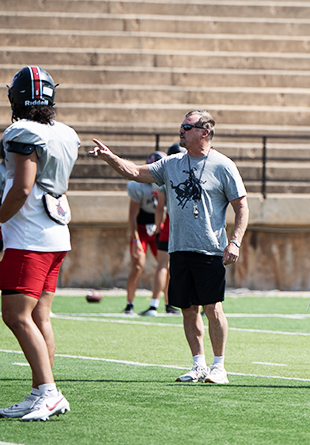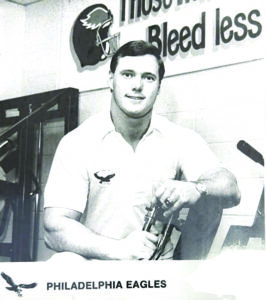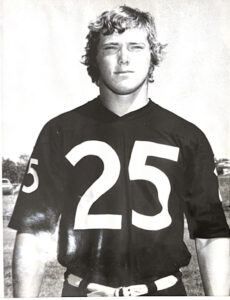By KEN IRVING, Student Reporter

It was the fall of 1975 in Alva, Oklahoma.
Crimson and gold leaves fell to the ground as a young and ambitious Ronnie Jones guided his girlfriend, Karla, into the VIP Club restaurant. Jones’ slick blonde hair and blue eyes glistened in the dim lights as he took Karla’s hand and aided her to her seat.
In the middle of the meal, Jones’ looked at Karla and smiled. He got on one knee and confessed his love for the girl he had known since first grade and proposed.
After dinner, Jones, Karla and their friends decided to attend a high school football game that was being played at the Northwestern Oklahoma State University football stadium. Jones and his friends were members of the NWOSU football team, so they were allowed to get into games for free.
Karla, on the other hand, was not a member of the team. Jones didn’t have any more money at the time, so Karla climbed into the trunk of Jones’ car and the bride-to-be hid from security until they reached the top tier of the stadium.
The high school sweethearts laughed at themselves as they spent their first moments after being engaged hiding from security. They watched the game in Jones’ car, thinking about their future together.
Forty-nine years later, both of them will smile from ear to ear and say that day is still their favorite moment.
Any marriage comes with sacrifices. One of those sacrifices for the Joneses was children.
“We never had kids because we didn’t think it was fair to raise a child whenever we moved so often,” Jones explained.
“Sometimes I didn’t even bother to unpack some of the boxes because I knew we might move soon,” His wife said. “I think the longest we ever stayed somewhere was about four years.”
Coaching career

Jones was a football coach in the National Football League for 21 years.
He was also a coach for Division 1, 2 and high school level for 23 years. He was constantly moving to new schools and new states as he chased his dreams of being an NFL coach. His wife knows they moved often; but understands why.
She said sometimes she would be a little upset because she might have found a job she liked, but at the same time she was thankful for all the new friends she got to make across the US. She said the good most definitely outweighs the bad.
Jones also knows it was tough on his wife because they moved often, and he was occupied with football most of the time.
“It takes a special wife to be a coach’s wife, with all the moving around that you do,” Jones said. “I get a job and I up and leave. She’s left selling a house a house, making all the arrangements. … It does make me feel guilty sometimes, but she’s understanding. She knows how important this is to me and the beauty that we share together. She’s my greatest supporter and probably gives me more good advice than anybody that I’ve ever been around. It’s been a great ride, and we’ve never had a problem in our marriage.”
They both agree that being from a small town has allowed them to enjoy every new city because it was all new to them.
Having a wife that is always there for you made it easier for Jones to concentrate on his NFL career, he said.
“Oh, Ronnie was one of the best strength and conditioning coaches in the league,” former coach of the Atlanta Falcons and additional NFL teams, Jerry Glanville said.
“When I first met Ronnie, I knew him as a strength and conditioning coach,” Glanville said. “He had made his name as a strength and conditioning coach with the [Philadelphia] Eagles before making his way to a defensive coaching position.”
After being the strength and conditioning coach at Arizona State University, Jones was offered a job with the Philadelphia Eagles. During his time in the NFL, Jones worked for the Philadelphia Eagles, Los Angeles Rams, Los Angeles Raiders, Houston Oilers, Arizona Cardinals and Buffalo Bills.
“You know, Ronnie’s been around a lot of legendary coaches,” said Brad Franz the athletic director of NWOSU.
“What really develops you as a coach are the people that you get to learn from,” Jones said. “I took something from every head coach that I worked with. John Cooper [Tulsa and Arizona State head coach], I learned that when things aren’t going well, go back to the basics. Buddy Ryan [Philadelphia Eagles head coach], I learned physicality and toughness. Al Davis [hall of fame owner for the Los Angeles/Oakland Raiders], I learned about evaluating personnel. Wade Phillips [Philadelphia Eagles and Buffalo Bills defensive coach], I learned about relationships with players. John Robinson [Los Angeles Rams], I learned about the value of the running game.”
Jones’ tenure in the NFL helped him grow as a football coach and a person.
He said you get out of everything what you put in.
He said you get what you deserve in football and if you work hard enough you will receive great things.

Champion
Although he has been coaching football for 45+ years, one of his favorite coaching memories has nothing to do with football.
Jones’ first coaching gig was at Northeastern Oklahoma State where he was an assistant football and track coach.
The first season was not a successful season for the track program.
Jones decided that if he took control of the program, he would do his best.
He said he recruited all over the states of Oklahoma and Texas as if they had scholarships.
They ended up winning the first conference championship in the history of the school.
“Nobody else probably cared except me and those track athletes, but I knew what I had accomplished from a coaching standpoint,” Jones said. “Taking that track team in my second year of coaching and seeing what you can accomplish if you work hard at it and getting your student athletes to believe and give it everything they got is just unbelievable.”
Jones has accomplished a lot of feats in his coaching career. He’s won the Pac 10 championship in Division 1 football, won a few division titles in the NFL and played in some big ball games, but winning that track conference championship in his second year of coaching means the most to him.
Jones said it meant so much to him because he felt like it was just him and his team that year. He felt close with his athletes, and he said he was just so proud of them because he knew what it took to get there.
For the athletes
“One thing I really noticed about him [Jones], is that he loves the kids,” Glanville said. “It’s all about the kids with him. He never quits or gives up on the kids.”
Jones said he coaches because he wants to help and better the life of every athlete he coaches. He also doesn’t know anything else except to be a football coach.
“Coaching isn’t what you [Jones] do, it’s who you are,” His wife said to Jones one day.
“Everything I try to fix at my house, I end up breaking,” Jones said jokingly. “But that’s because all I know is football, and I love that. I’m passionate about that.”
Jones’ love for football stems from one of his high school football coaches, Jackie Needham, who was Jones’ coach during high school. Needham was a former college football player that took an interest in Jones’ and helped him during high school.
Jones liked Needham’s coaching style and looked at Needham as a role model. Jones said that his love for coaching came from the moments that Needham had with him.
Growing up
Jones had siblings that were around him almost all the time, so he learned to adapt and teach them certain things growing up.
Jones grew up in Sunray, Texas. He was raised by both his parents. He had an older brother and sister and a younger brother. Growing up, Jones played whatever sport was in season.
His graduating class only had 35 students in it, so he was a member of every team that they had.
Jones was a standout football player in high school. This led to him being recruited by Northwestern Oklahoma State University. Jones committed to NWOSU and played here from 1974-1978.
He was inducted into the NWOSU hall of fame in 2001.
Back to NWOSU
Forty-six years later, Jones is back at his alma-mater as the head coach of the football program.
“There’s nothing more than I would love to do than bring my alma mater back to its winning ways,” Jones said. “I love the challenge. It’s different than any other job because I have ties here. It’s a chance to give back. … When I finally walk away from this job, I promise the program will be in good shape. I’m not leaving till it is. This will be my last coaching job. … When I walk, away people are going to be proud of this program and the success that we’re having.”
The first thing Jones did when he got the job was pack a suitcase, hop into his truck and drive to Alva.
The next thing he did was call Coach Jason Medrano.
“I told my wife if he ever called me and offered me a job then I’d go with him,” Medrano said. “When I got the call, I looked at my wife. She said ‘we’re moving?’ I said ‘yes we are’.”
Medrano is the Offensive Coordinator for the NWOSU Rangers. He said he met Jones at West Texas A & M in 2002 when Jones offered Medrano his first coaching job.
“I have a lot of respect for him, just by the way he treats people,” Medrano said. “At West Texas, he took all of his young coaches to eat one day. He told us that the biggest thing to remember as coaches is loyalty. From that day on I’ve looked for loyalty in every coach that I’ve hired because [Jones] was loyal to me.”
Jones and Medrano coached together at West Texas for a few years before Jones went to coach high school football.
Consistent Intensity
Although Jones has no regrets about his coaching career, he does wish that he did enjoy his players a little bit more.
“I didn’t realize it until I got older, but I was missing the most important part of coaching for many, many years, and that’s enjoying the players that you’re coaching,” Jones said. “I was so driven with my own career, going from position coach to coordinator to head coach. I was so driven by furthering my career that I missed out on just enjoying the players and getting to know my players better. I’m at the point now that the most enjoyable part of my job is just being around my players.”
In 1980 Jones hung a sign on his mirror that read “Consistent Intensity” and looked at it every day.
He said as a young coach he strived to be consistent in everything he did.
Forty-four years later his players and coaches agree that he has been just that.
“I’ve always been driven by the fear of failure because I don’t want to be just another guy,” Jones said. “I want to be something special. You only get one shot in this life, and when it’s all said and done, I hope I’m remembered as someone who accomplished great things. I don’t want to let anyone down. More importantly, the one person I want to be proud of me, is my wife. We’ve been together forever, and she supports me so well and I never want to let her down.”

